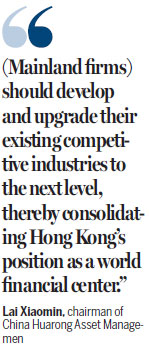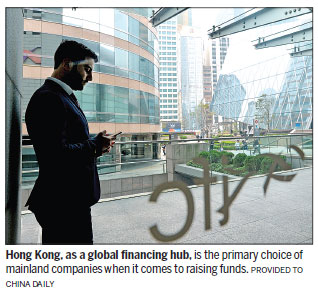Mainland influx spurs turnaround in HK equities
Updated: 2017-07-01 08:30
By lin wenjie in Hong Kong(HK Edition)
|
|||||||||
The dramatic surge in the tally of Chinese mainland companies floated in Hong Kong in the past two decades has led to a significant shift in the city's traditionally property sector-reliant stock market, providing a more diversified structure with capacious choices for local and foreign investors.
Market pundits concur with the fact that mainland enterprises have been making a positive contribution to the stability and growth of the local economy, as well as cross-boundary integration, and will continue to promote a "win-win" scenario for both Hong Kong and the mainland by exploring new business opportunities under the framework of national strategies.

"There has been a radical change in these 20 years regarding the quantity of mainland companies listed in Hong Kong. Twenty years ago, only big State-owned enterprises got listed here, such as Beijing Enterprises Holdings, but now many private and local-government-owned companies from the mainland have gone public in the local stock market," noted Ginger Cheng Sze-ching, head of Hong Kong and mainland corporates at DBS in Hong Kong.
Statistics show there were 1,013 mainland enterprises listed in Hong Kong as of March this year, accounting for 50.4 percent of the total number of listed enterprises, and 63.7 percent of total market capitalization. In comparison, there were just 83 mainland companies listed in Hong Kong 20 years ago, accounting for merely 8.5 percent of total market capitalization.
Along with the mainland's rapid economic development, it's noted that the quality of mainland companies has also gone up substantially, with many of them having gained popularity among local and overseas investors.
Tech behemoth Tencent Holdings Ltd, one of the most sought-after mainland enterprises, became a Hang Seng Index constituent company in 2008 - four years after its flotation. Its share price has soared nearly 300 times over its IPO price, with a market capitalization of HK$2.6 trillion, making it one of the five most influential companies listed in the SAR.
"Hong Kong, as a global financing hub, is the primary choice of mainland companies when it comes to raising funds, due to its free flow of capital, access to international and institutional investors, and a great pool of talents and expertise. At the same time, Hong Kong's stock market, which had largely banked on property companies in the past, now offers a much more diverse environment," said Tom Chan Pak-lam, chief executive officer of Success Finance Group and vice-chairman of the Institute of Securities Dealers Ltd in Hong Kong.
He said Hong Kong's listing requirements and financing costs are much lower than those of other places for companies to collect money. And, notably, the city's investment is much more mature and less volatile.
For corporations that have already sunk their roots in Hong Kong, experts believe they can make full use of their prime location to achieve mutual benefit for Hong Kong and the mainland by using Hong Kong as the springboard to "go abroad", cashing in on national strategies, including the Belt and Road (B&R) Initiative.
Cheng's confident Hong Kong can and will play a significant role in the internationalization process of mainland companies by providing excellent talents, useful market information and various financial products.
"We've seen a growing number of mainland companies that have gone global via Hong Kong in these 20 years," she said.
Lai Xiaomin, chairman of China Huarong Asset Management, called for mainland companies in Hong Kong to leverage the opportunities arising from the B&R Initiative.
"They should develop and upgrade their existing competitive industries to the next level, thereby consolidating Hong Kong's position as a world financial center," he said.
The State-run bad-debt cleanup agency raised HK$17.8 billion in an IPO in Hong Kong two years ago. It plans to set up a B&R development fund of up to $3 billion to finance infrastructure projects in countries and regions involved in the massive project.

(HK Edition 07/01/2017 page1)